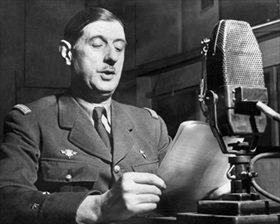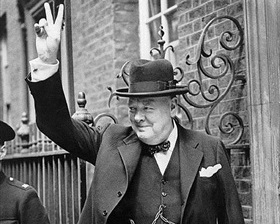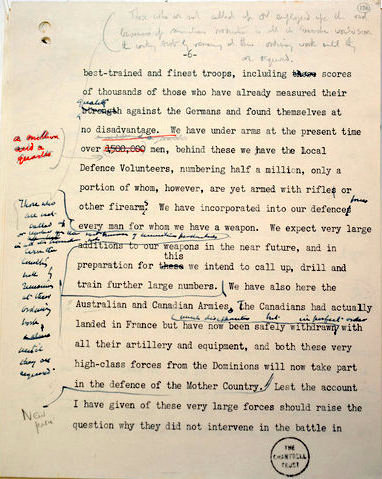CHURCHILL TO BRITISH: BRACE YOURSELVES
London, England · June 18, 1940
Four days after the fall of Paris to German invaders, Charles de Gaulle, a tall (6 ft, 4 in), young (49), relatively unknown French general who had escaped to England on June 17, 1940, addressed the French people in a radio broadcast from London on this date in 1940. In a celebrated call to arms, de Gaulle said: “The flame of French resistance must not and shall not die!” The BBC gave de Gaulle’s “Free French” movement a five-minute slot each evening, and over the next ten days the Frenchman’s voice gained authority. His message was the same: It was a crime for French men and women in occupied France to submit to their occupiers, and it was an honor to defy them. “Since they whose duty it was to wield the sword of France have let it fall,” he said accusingly nearly a month later of the top military and political people who coalesced around the 84-year-old Vichy president Marshal Philippe Pétain, “I have taken up the broken blade.” Also on this date, June 18, 1940, Soviet Foreign Minister Vyacheslav Molotov congratulated Adolf Hitler for the “splendid successes of the German Wehrmacht” in France and the Low Countries. Molotov would live to regret his flattering words just over a year later, when Hitler launched his surprise invasion of the Soviet Union (Operation Barbarossa). As British citizens anxiously awaited for the next shoe to drop—namely, Germany’s inevitable invasion attempt of their island nation—Prime Minister Winston Churchill stood before the House of Commons in London and in front of BBC microphones to say: “The Battle of France is over. I expect that the Battle of Britain is about to begin. . . . The whole fury and might of the enemy must very soon be turned upon us.” Churchill did not flinch from acknowledging the great apparent danger these events posed to Britain’s national survival and national interests in this, the third of three speeches he gave during (roughly) the Battle of France (May 10 to June 22, 1940). But he turned the grave situation into a roar of determination and defiance when he concluded his address, saying: “Let us therefore brace ourselves to our duties, and so bear ourselves that if the British Empire and its Commonwealth last for a thousand years, men will still say, ‘This was their finest hour’.”
[amazon_carousel widget_type=”ASINList” width=”600″ height=”200″ title=”Recommended Reading” market_place=”US” shuffle_products=”False” show_border=”False” asin=”0300084668,125000215X,0374531331,0307388719,1596987758,1608193721,0345548639,1848857187,0300089163,1849165475″ /]
Call to Arms: Gen. Charles de Gaulle and Prime Minister Winston Churchill, June 18, 1940
 |  |
Left: Gen. Charles de Gaulle in the studios of the BBC in London, October 10, 1941. This photograph has sometimes been used in connection with de Gaulle’s “call to arms” speech of June 18, 1940, of which no photograph exists.
![]()
Right: Winston Churchill giving his famous V-sign (used to represent the letter “V” in “Victory”) on May 20, 1940, just ten days after he became prime minister, and on the day German troops reached the English Channel in preparation for their exterminating the British Expeditionary Force trapped at Dunkirk on the French coast.
![]()
Below: A draft of Churchill’s “Finest Hour” speech shows the way he extensively edited it before delivering it to the House of Commons on June 18, 1940. In 36 minutes of soaring oratory, Churchill sought to rally his countrymen with what has gone down in history as his “finest hour” speech. The speech—ending with the words, “Let us therefore brace ourselves to our duties, and so bear ourselves that if the British empire and its Commonwealth last for a thousand years, men will still say, ‘This was their finest hour’”—has resonated ever since. On both sides of the Atlantic and beyond, it has been hailed as the moment when Britain found the resolve to fight on after the fall of France and, ultimately, in alliance with Allied military forces (what would be called the United Nations) to vanquish Hitler’s armies that had overrun most of Europe.

Excerpt from Winston Churchill’s “Finest Hour” Speech to the House of Commons, June 18, 1940
![]()

 History buffs, there is good news! The Daily Chronicles of World War II is now available as an ebook for $4.99 on Amazon.com. Containing a year’s worth of dated entries from this website, the ebook brings the story of this tumultuous era to life in a compelling, authoritative, and succinct manner. Featuring inventive navigation aids, the ebook enables readers to instantly move forward or backward by month and date to different dated entries. Simple and elegant! Click
History buffs, there is good news! The Daily Chronicles of World War II is now available as an ebook for $4.99 on Amazon.com. Containing a year’s worth of dated entries from this website, the ebook brings the story of this tumultuous era to life in a compelling, authoritative, and succinct manner. Featuring inventive navigation aids, the ebook enables readers to instantly move forward or backward by month and date to different dated entries. Simple and elegant! Click 











